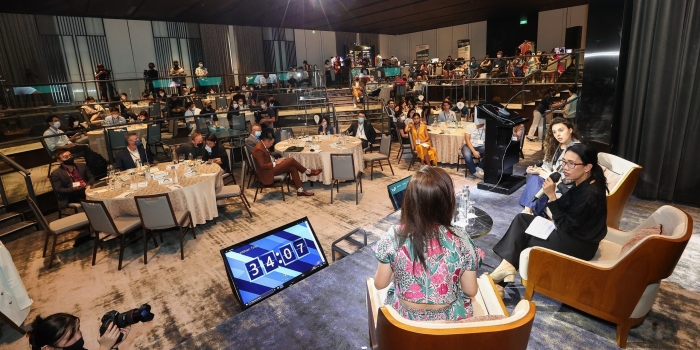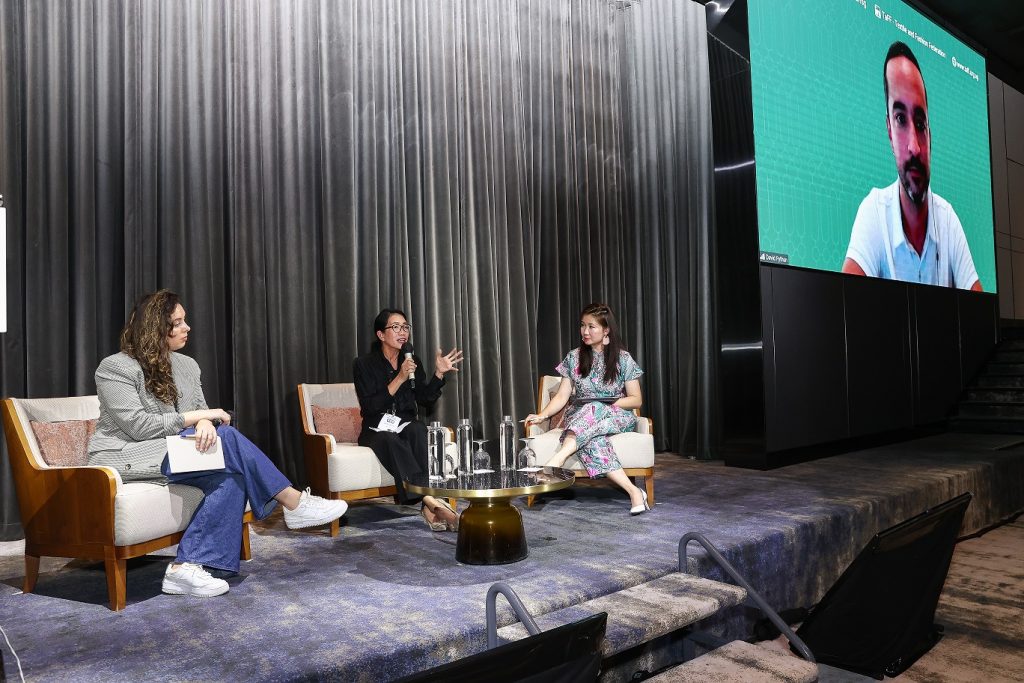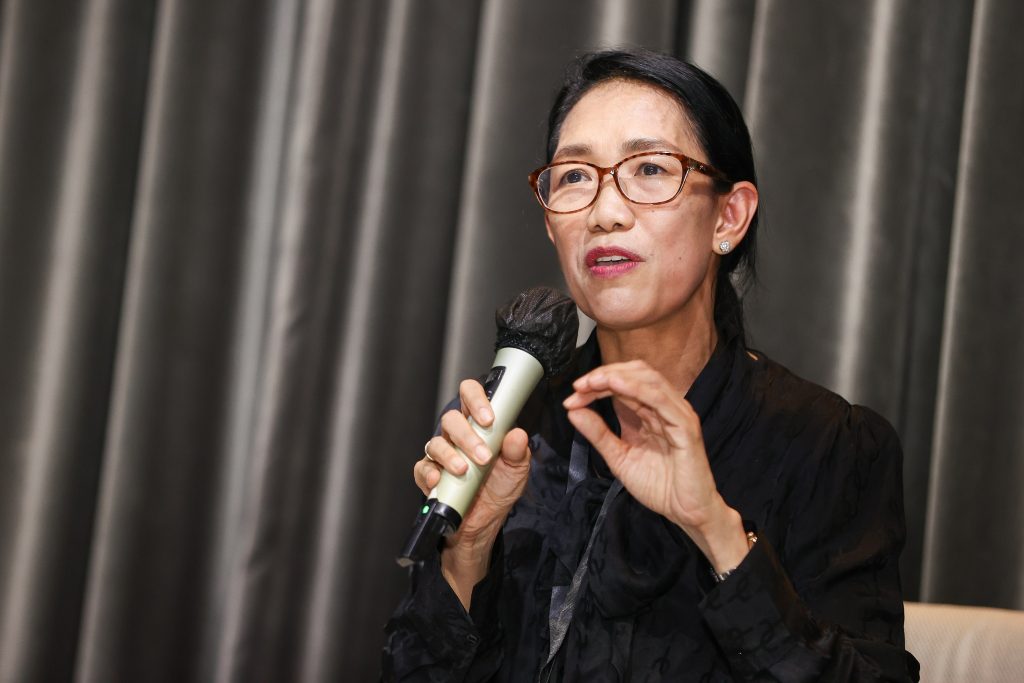Biogas Power Plants for a Sustainable Future
Asian Agri recently announced it has built five biogas power plants across Sumatra – two units in North Sumatra, two in Riau and one in Jambi. This marks Asian Agri’s...

Latest updates on what's happening in RGE Group

From fast fashion to e-commerce to the large amounts of clothes being thrown away, the fashion industry is a significant contributor to carbon emissions, accounting for around 10% of global greenhouse gas emissions — more than international flights and shipping combined. There is an urgent need for the industry to rethink their existing practices.
How exactly can the fashion industry accelerate a climate-positive future?
Kicking off the first panel discussion at the Textile and Fashion Federation Singapore’s (TaFF) “Enable the Change” Fashion Sustainability Summit 2022 held on 6 July 2022, APRIL Group’s Director of Sustainability & External Affairs, Lucita Jasmin, noted a building momentum towards more sustainable fashion. She shared four emerging trends that will drive Southeast Asia’s fashion industry in the next five to 10 years:
Titled “Transforming intent into results: How can fashion reduce its environmental impact?”, the robust panel discussion was moderated by Ms Fang Eu-Lin, Sustainability and Climate Change Leader and Lead of the Asia Pac Centre for Sustainability Excellence at PwC Singapore. In addition to Ms Jasmin, the other three panellists were Ms Joyce Tsoi, Director of Collective Action Programs at APAC Sustainable Apparel Coalition; Ms Susannah Jaffer, Founder of Zerrin; and Mr David Python, co-founder and CEO of CARIUMA. They shared views from the coalition, brand and consumer perspectives.
Commenting on material choice, Ms Jasmin said, “There’s a wide latitude for transition towards something that is actually produced in a responsible manner, and also coming from a renewable bio-based raw material.”

The panel discussion saw Ms Jasmin and her fellow industry experts discussing the drivers behind the growing momentum for sustainable fashion globally.
To support the sector’s drive for change, RGE is working with innovators, industry partners, research institutions and academia to scale up solutions that will deliver cleaner and more circular cellulosic textile fiber.
The RGE group of companies, which includes APRIL and Asia Pacific Rayon (APR), announced in 2019 a $200 million investment over the next 10 years to drive cellulosic textile fibre research and development (R&D). Ms Jasmin shared that beyond recycled materials, the R&D also extends to other forms of alternative materials including agricultural waste, as well as closed-loop manufacturing for viscose production and recycling. RGE has a multi-year partnership with the Nanyang Technological University on the establishment of the Sustainable Textile Research Centre (SusTex) to focus on innovation in textile recycling technology.
“We need to encourage the entire industry to look at this holistically, from the entire value chain, and see exactly how this business model of fast fashion is costing or triggering huge waste generation,” Ms Jasmin said. “Companies need to first relook at their business models and make sure they are founded on responsible consumption and production. And of course, in parallel, move forward with initiatives to advance recycling.”

APRIL Group adopts a landscape approach to managing its concessions. This includes implementing a protection-production model.
For APRIL, decarbonisation starts from forest management. Under its 2030 agenda, APRIL has committed to net zero emissions from land use and reduction of carbon emissions from the manufacturing process by at least 25%. This involves reducing energy use, while increasing the uptake of renewables.
“We’re already at about 80% in terms of sourcing energy from renewables, and these are by-products of the production process itself. We don’t have any scope 2 emissions because we don’t buy electricity, we generate our own mainly from biomass by-products of the manufacturing process. We still want to push that balance and try to increase the share of renewables by as much as 90%,” Ms Jasmin said.
A one megawatt (MW) solar panel has been installed in APRIL’s facility in Indonesia. Ms Jasmin said the company will increase this to 10MW this year, moving up to 25MW and eventually 50 megawatts by 2030.

Ms Lucita Jasmin sharing APRIL’s efforts in promoting sustainability throughout its value chain, in line with its APRIL2030 goals.
The panel also looked into how fashion companies should embark on their sustainability journey. Ms Jaffer suggested that businesses should look within their supply chain to implement greener practices, including how products are designed, the choice of fabrics and materials, and how potential waste can be eliminated from the start of the production process. This will encourage a shift in mindset to thinking about end-of-life outcomes right from the beginning.
Mr Python suggested that companies can start off with self-assessments via publicly available tools and resources, such as the Higg tools, before progressing to third-party assessments to amplify green impact through their business and supply chain. Measuring impact will help businesses determine if their trajectory is heading in the right direction.
Ms Tsoi echoed keynote speaker Mr Erik Solheim’s sentiments. Companies are starting to see sustainability as an opportunity rather than a cost. There are a multitude of low cost and even no cost opportunities — from decarbonisation to increasing material efficiencies or energy efficiencies, which could allow businesses to save up to 20% on their bottom line.
Beyond opportunities, Ms Jasmin highlighted that businesses need to start looking at sustainability as an investment and consider the value proposition and business case for green initiatives. She said, “You can either look at it as an investment now, or you can look at it as a cost later on. Take carbon for example — this is about bringing in what were previously considered externalities and embedding them into mainstream business considerations. Do you want to pay carbon tax later? Do you want to pay for carbon offsets? Or do you want to invest in decarbonising your processes right now?”
Responding to a question from the floor on how companies, countries, governments and individuals can be held accountable in their quest for sustainability, Ms Jasmin emphasised the importance of monitoring, verification, and transparent reporting.
For example, APRIL participates in a variety of disclosure platforms, and APR has established a traceability solution which it hopes can extend to the rest of the value chain. APRIL’s Sustainability Reports are independently audited and publicly available.
Other panellists called for more legislation and support from all stakeholders to drive accountability.
As moderator, Ms Fang noted that the multi-lateral, globally-connected fashion industry is now at a period of green transitioning. With the growing affluence in Southeast Asia, consumers and business owners can make an impact with their choices and how they run their businesses. Everyone in the ecosystem can be a changemaker.